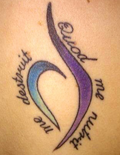1. Eating Disorders are not a choice.
One of the most upsetting things someone could have said to me when I was at my most unwell was that I was choosing to be that way. It can be so hard to express to somebody that you are not able to control your own thoughts, and that your mind is constantly causing you to deny yourself a basic human right; the right to eat. Although it is possible to make the choice to eat, it is not possible at that time to choose to avoid the feelings of intense guilt and self-hatred that follows. These are just some of the feelings that come with having an eating disorder, and it can take a very long time and a lot of hard work to lessen those feelings and to make eating the more worthwhile choice.
2. It’s okay to talk to me about my eating disorder.
By this, I don’t mean by asking how much I weigh or how much I’ve eaten. These questions will likely cause me to feel defensive and embarrassed. But it is okay to ask me how I am, if there is anything I’m finding particularly challenging, and if there is anything that you could do to help. If I don’t feel comfortable answering I will say, but chances are it will make me feel like you care and want to support me. People with eating disorders can often feel very ashamed, and it is by talking and encouraging openness and honesty that we will break down the stigma surrounding them and promote recovery. However, please don’t comment on my appearance. You might see me making progress, and that’s great. Whilst I might speak positively about recovery, I may still be battling my distorted body image constantly. If you have noticed I seem happier, please say so. If you think I have been more relaxed, please say so. But please don’t tell me I ‘look well’, or that I am looking ‘much healthier’. My rational brain understands that you mean well and are trying to be complimentary and supportive. My eating disordered brain will translate those comments into ‘you look fat’ or ‘you have gained weight’. This can cause both parties to feel guilty and upset. Eating disorders are about so much more than appearance, and it is by talking about the thoughts and feelings that go alongside them that we will really begin to understand them.
3. Please try and be patient.
Chances are, I will lie to you. I will be deceptive. I will tell you things are fine when they aren’t. I will start doing well, and then I won’t again. But none of these things mean I’m not trying and that I don’t care about you. Often I am hiding things because I don’t want to hurt you, and because I feel guilty for putting you through this. Please don’t give up on those who are suffering. Continue to encourage them to talk to you, and remind them that you are there no matter what stage of recovery they are at.
4. Eating Disorders are a mental illness.
There is nothing vain about having an eating disorder. Wanting to lose or control your weight is a side effect of deep rooted and complicated emotional difficulties. It is not about wanting to look like a celebrity or to gain attention. Sufferers often feel a deep sense of shame and do not want to draw attention to their illness, which can be influenced by the fear that this stigma of vanity and narcissism will reflect badly on them. I have been so scared at times that people would think I was behaving in these ways to ‘gain attention’, when I had actually spent so long trying to cover them up and hide them from others. Eating disorders are incredibly dangerous, and more physically painful than is imaginable. Even after recovery, the physical side effects can last for months, years, and even be permanent. It is time that we broke through the discrimination that eating disorder sufferers experience and understand what they are really about.
5. Men get eating disorders too.
Eating disorders are so commonly thought of as a female illness. This can cause men to feel ashamed about accessing treatment, so the true figures of how many men are actually suffering from eating disorders is unknown. However, eating disorders do not discriminate. They can and do affect people of any age, gender and race.
6. Recovery is possible, and it is worth it.
I had an eating disorder in one form or another for 12 years. I have been treated under CAMHS and adult services, and as both an inpatient and in the community. Last October marked the end of what I hope to be my last episode of treatment. This October marked the longest time I have been ‘in recovery’ for without relapse, and I am currently the furthest into recovery that I have ever been. It is hard to fully appreciate how all consuming, debilitating and painful eating disorders can be, and it can seem like it is impossible to get better. But it is possible, and it is worth it. There were countless times when I felt like giving up, but my life is so much fuller and richer now than it has ever been. I am immeasurably happier, and it is by far the hardest but most worthwhile thing I have ever done. I would encourage everybody to talk about eating disorders, whether you know someone who is suffering, have done so yourself, or want to spread awareness to others. I wouldn’t be where I am today without learning to talk.
What do you think about the issues raised in this blog?
Share your views with us on Twitter >>
Or sign our pledge wall to show your support and find out how talking tackles mental health discrimination.
SOURCE: Time To Change – Eating disorders – Read entire story here.




